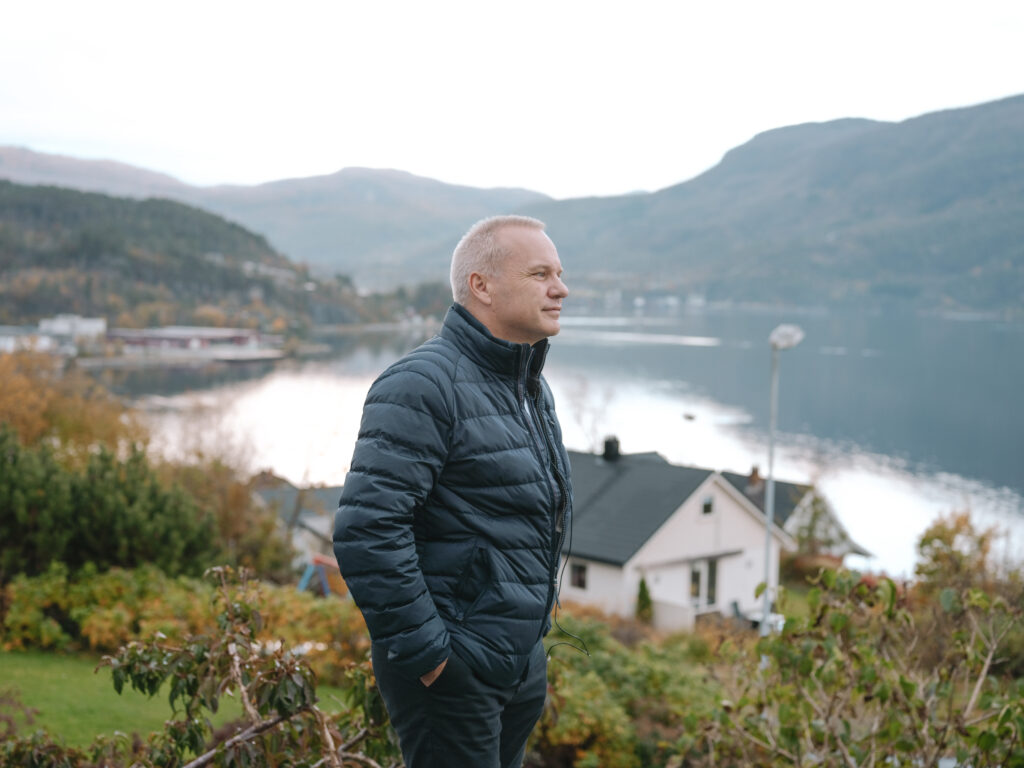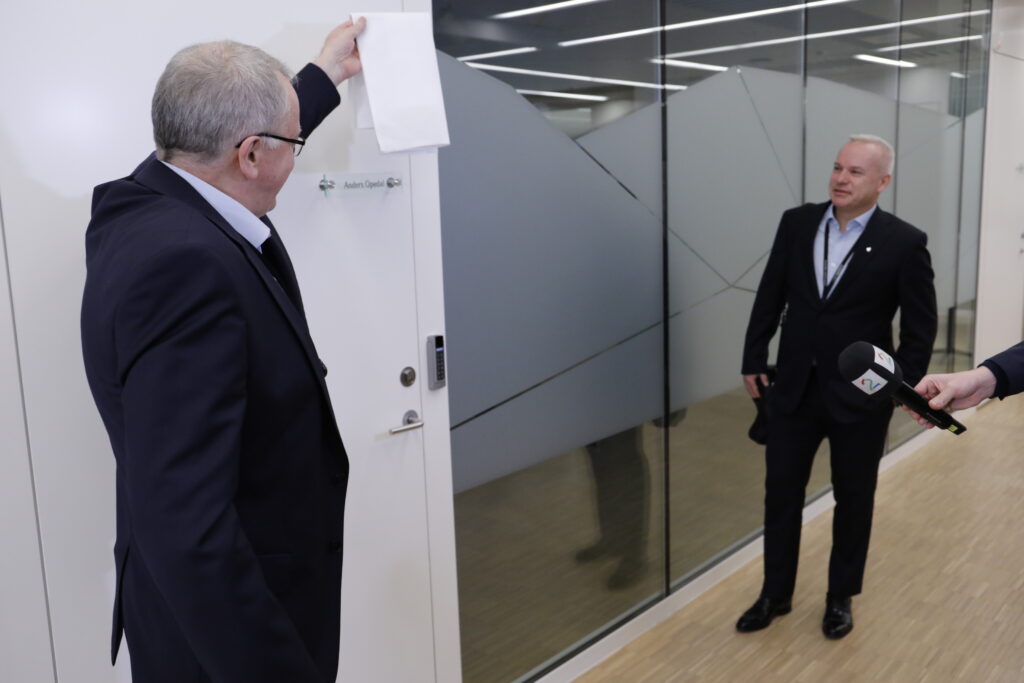Anders Opedal – between industry tradition and energy transition

Opedal has deep roots in Norway’s industry traditions. He was brought up in Sauda north of Stavanger, which depended almost wholly on a single heavy industrial company. That gave him experience of how a local community can be shaped by a sector exposed to strong international competition. As Statoil’s recently appointed CEO, he has not least emphasised the inspiration provided by the adaptability of the process industry.[REMOVE]Fotnote: “Having a summer job in a metal smelter alongside those who worked there permanently meant that I acquired great respect for the way Norway’s process industry constantly improved in the face of strong international competition. It has always succeeded in renewing itself, and remains a leader in a number of segments. So, as the oil and gas industry becomes a more marginal sector, I believe we will take a good look at what the process industry in Norway has achieved”, quoted from Schultz, Jakob, Solgård, Jonas and Christensen, Jonas, “Ny Equinor-sjef Anders Opedal: – Vi vil gradvis bli færre”. Dagens Næringsliv, 10 August 2020.
Later, Opedal also witnessed the ability of the petroleum industry to adapt. The big changes during his time at Statoil/Equinor have related to partial privatisation, the merger with part of Norsk Hydro, growing internationalisation and responding to the climate issue. His predecessor, Eldar Sætre, was involved to a great extent in defining these processes. From the time he joined Statoil until 2020, Opedal was at least one level below Sætre in the corporate hierarchy. His role has therefore largely concerned responsibility for ever more important parts of the operational implementation of these structural changes.
Ambiguity
So to what extent is the energy transition – understood here to mean a move to a broader and more climate-friendly energy range – associated with the industrial tradition?
One answer is that obvious transfer value exists. Utilising offshore platforms to help develop offshore wind power offers a practical example.
A supplementary – and to some extent alternative – view holds that the industrial tradition is challenged by the energy transition. From that perspective, a substantial distance exists between the process and petroleum sectors on the one hand and solutions for the green shift on the other.
The picture is naturally complicated. Many possible routes exist for succeeding with the transition. That means the title of this article is ambiguous – it is partly through defining strengths and weaknesses in the threads connecting tradition and transition that Opedal will be able to define his profile – and Equinor’s.
Opedal’s world
Let us start the search for perspectives which can help to identify some of Opedal’s qualifications for shaping such a profile.

He has not only experienced the industrial culture which characterised Sauda through his own upbringing. It has also been digested by delving into the complex universe of fellow Sauda native Kjartan Fløgstad (born 1944) – although without necessarily sharing this author’s Marxist viewpoint.[REMOVE]Fotnote: Skarsaune, Erlend, “Industriens førsteelsker”, Stavanger Aftenblad, 24 April 2021: 23. Fløgstad illuminates the universal and the distinctive in such an industrial community – particularly the development of the working class in a society with a dominant and hierarchically structured cornerstone company. That part of the author’s output which deals with Lovra (a fictional Sauda) are the novels Dalen Portland (1977, Samlaget); Fyr og Flamme (1980, Gyldendal) and Grand Manila (2006, Gyldendal). Fløgstad has also written the history of the smelter in Arbeidets lys. Tungindustrien i Sauda gjennom 75 år (1990, Samlaget).
In his book on the smelter’s history, Fløgstad portrays an industrial environment which is largely dominated by a company vulnerable to foreign competition. He also depicts an industry whose identity is changing – in part because of environmental challenges.[REMOVE]Fotnote:Fløgstad, Kjartan, 1990, Arbeidets lys. Tungindustrien i Sauda gjennom 75 år: 207. That is not wholly unlike the experience of companies such as Equinor today.
Naturally, no individual decisions in Opedal’s career can be solely attributed to such a background. But it is important for understanding the type of industrial and engineering identity which he has himself emphasised,[REMOVE]Fotnote: Skarsaune, Erlend, op.cit: 23-24; Opedal himself has noted the significance of growing up in Sauda: “Equinor builds industry. We develop energy and thereby also build society. My upbringing in Sauda undoubtedly sits deep within me here. Energy was used there to build a society, a local community dependent on the cornerstone company”, quoted from Skarsaune, Erlend, “Koronapandemien gjorde Anders Opedal sikker på at han ville ha Equinor-jobben” E24.no., updated 12 August 2020, https://e24.no/olje-og-energi/i/8mrnPG/koronapandemien-gjorde-anders-opedal-sikker-paa-at-han-ville-ha-equinor-jobben, accessed 2 March 2022. and which could be significant for his overall view of the questions he will be involved in answering.
Education and early career
Framed by this heavily industrialised local community, including personal experience of the work through six summer holiday jobs at the smelter, Opedal grew up in a family with academic traditions. Both his parents were teachers.
He followed this up by moving to Trondheim to take an MSc in engineering at the Norwegian Institute of Technology (NTH), now the Norwegian University of Science and Technology (NTNU).[REMOVE]Fotnote: Annual report, 2018, Equinor: 116. (References to annual reports in this text refer to the Norwegian edition of the reports.) He then secured jobs with suppliers Schlumberger and Baker Hughes related to analysis and drilling. That gave him an important perspective on this part of the industry.
Opedal transferred from the supplier industry to the operator side in 1997, when he joined the Statfjord operations organisation at Statoil.[REMOVE]Fotnote: Ibid. After several years in various management posts, he became chief procurement officer in 2007 and senior vice president for projects in 2010. He also took a master of business administration (MBA) degree at Britain’s Heriot-Watt University.[REMOVE]Fotnote:Ibid.
Towards the top
After Eldar Sætre became Statoil CEO in 2014 and changes were made to the senior management structure the following year, Opedal became a member of the corporate executive committee for the first time. He was appointed the company’s first chief operating officer (COO) on 1 April 2015,[REMOVE]Fotnote: Annual report, 2015, Statoil: 102, note 2. which put him in charge of extensive cost-saving efforts.
He was posted to Brazil from 30 November 2016 as executive vice president for development and production international,[REMOVE]Fotnote: Annual report, 2016, Statoil: 195, note 11. and became executive vice president for development and production Brazil (DPB) from 17 August 2018.[REMOVE]Fotnote:Annual report, 2018, Equinor: 130, note 14. Activities in Brazil were reorganised at this time as a separate business area with its own executive vice president.
On 15 October that year, Opedal became executive vice president for technology, projects and drilling (TPD).[REMOVE]Fotnote: Annual report, 2018, Equinor: 116.
At the top

Opedal was appointed CEO of Statoil on 2 November 2020.[REMOVE]Fotnote:Annual report, 2020, Equinor: 130. He is the first person with an engineering background to reach the top of the company, and the second to be recruited internally after Sætre. The position was also somewhat exceptional in that Sætre not only resigned of his own volition but also informed the board of his desire to step down in good time beforehand. The directors therefore had plenty of time to find his successor.
In other words, Opedal’s varied educational and occupational background contrasts to some extent with that of previous Statoil CEOs.
With this expertise, he leads the company with a mandate from the board “to accelerate our development as a broad energy company and to increase value creation for our shareholders through the energy transition”.[REMOVE]Fotnote:Equinor website, Anders Opedal taking over as president and CEO of Equinor from 2 November 2020, 10 August 2020, https://www.equinor.com/news/archive/20200810-management, accessed 16 February 2020. The ambition is to be climate-neutral by 2050.[REMOVE]Fotnote: Equinor website, Equinor sets ambition to reach net-zero emissions by 2050, 2 November 2020, https://www.equinor.com/news/archive/20201102-emissions, accessed 23 February 2022.
Cornerstone
Opedal grew up in a local community with a single cornerstone company. The transfer value between the Sauda smelter and Statoil/Equinor is clearly limited. Nevertheless, Equinor is – thanks to its central position in a dominant industry – in one sense Norway’s cornerstone company. For half a century, it has been owned wholly or partly by the Norwegian state. Over the years, many views have been expressed about the company’s power and influence – and climate footprint. From that perspective, the company carries with it a distinct tradition in the meeting with today’s energy challenges.
It is precisely at this interface between industrial tradition and energy transition that Opedal can make his contribution to ensuring that Equinor plays the role of a responsible national cornerstone company in the future.
Convincing shareholders and society at large that durable value creation can be combined with ambitious and realisable climate measures is no easy job. But if this work succeeds, the company with Opedal in the lead will have helped to turn the long threads in modern Norwegian industrial history in a greener direction.
arrow_backHazardous fires at onshore plantsMultiphase approach to Trollarrow_forward